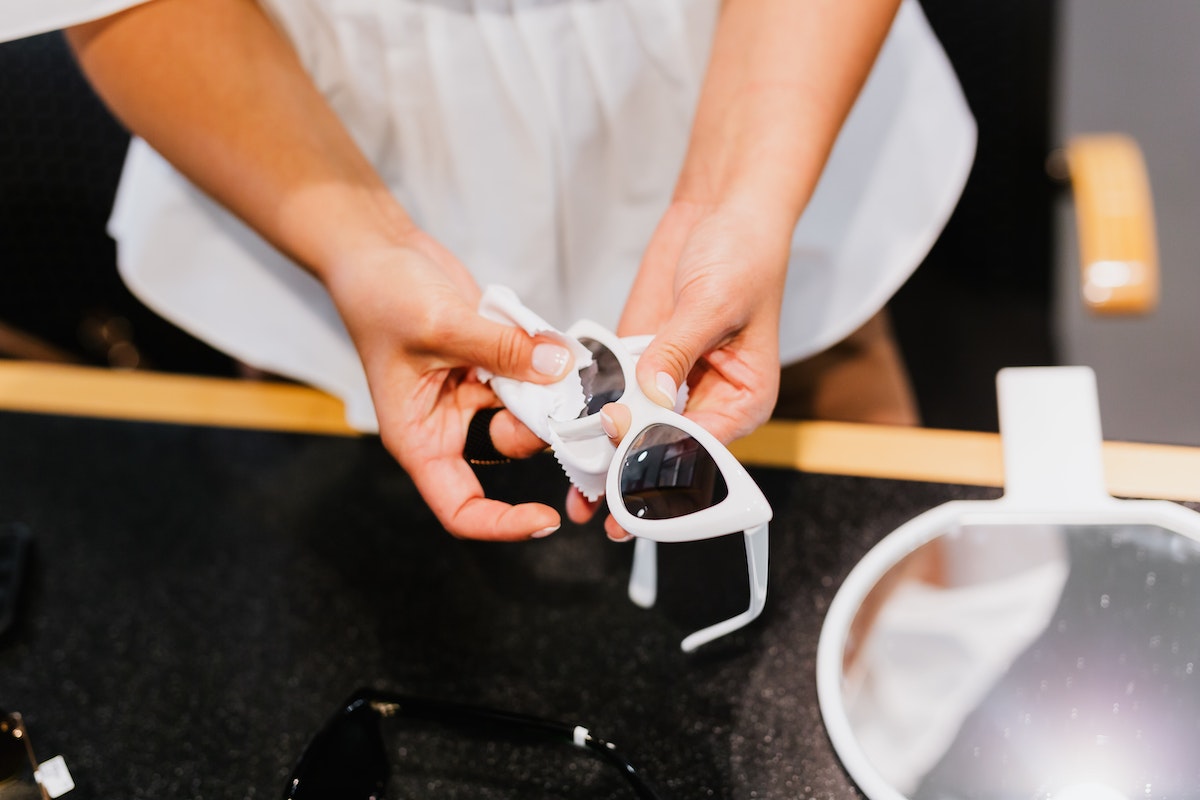If you wear glasses, you’ll know how quickly they get streaky or accumulate dust and debris. Regularly using glasses cleaner is highly recommended to keep your specs in perfect shape – but have you ever wondered if that handy little bottle of eyewear cleaning spray could have other uses, like cleaning your laptop screen, for example?
Below, we answer some of the most common questions regarding what is – and isn’t – ok to use glasses cleaner on. But first, let’s have a super quick whirlwind tour of how to properly clean your glasses or shades using purpose eyeglass cleaner.
What is the Process for Cleaning Glasses Using Glasses Cleaner?
Whether you wear spectacles daily, just for distance work, or love rocking your prescription sunglasses at every opportunity, keeping your eyewear clean is vital. Doing so will keep your glasses functioning optimally and can even extend their life.
Start by washing your hands with soap and water – as well as removing any bacteria present; this will also prevent oil from your fingers from smudging the lenses. Next, spray a small amount of glasses cleaner on both sides of the lenses and gently rub them with a soft cloth – most cleaners are self-drying, and you’ll be left with a crystal-clear, streak-free shine.
While it may be tempting, it’s best never to use washing-up liquid, hand sanitizer, household glass cleaner, hot water, or saliva to clean your glasses. Regret will follow.
Can I Use Glasses Cleaner on My Laptop Screen?
In general, it’s not recommended to use eyeglass cleaner to clean your laptop’s screen. This is because many types of cleaner contain chemicals or other components that could cause damage to the screen. It’s also important to never be tempted to use an alcohol wipe on the screen: there’s a chance it could strip away the anti-reflective coating.
So, what should you use instead to get your laptop screen nice and clean? A simple microfiber cloth is a must – a quick daily wipe is a great way to keep dust and other debris from building up. If your screen needs a more thorough cleaning, you can spray a fine mist of distilled water onto your microfiber cloth and gently wipe it over the surface.
Can I Use Glasses Cleaner to Clean Jewelry?
Yes! Although there’s an important proviso: cleaner containing ammonia or alcohol shouldn’t be used, as this could damage your jewelry. Glasses cleaner is particularly good for cleaning diamonds: it’ll bring them up to a dazzling shine!
All you need to do is use an old toothbrush to apply the cleaner to the item of jewelry, then rinse well and dry with a soft cloth or towel – the cleaner should not be left on the jewelry for longer than two minutes.
Are Glasses Cleaner Good for Degreasing?
Absolutely – one of the key functions of glasses cleaner is to remove oil and grease from the lenses. Due to this, it can also be perfect for deploying on kitchen surfaces to get rid of hard-to-shift grease. Kitchen surfaces, stoves, and stove hoods are some of the areas that you could target, although it’s vital first to ensure that none of the cleaner’s ingredients will cause damage. Don’t forget to rinse the surface thoroughly after cleaning to remove all traces of the product.
Is it Safe to Use Glasses Cleaner on Contact Lenses?
This is a huge and emphatic NO! As well as potentially causing damage to your lenses, eyeglass cleaners could cause severe irritation or damage to the eyes. On no account should glasses cleaner be used on contact lenses. To clean contact lenses, you’ll need to buy a custom-made contact solution that’s suitable for the type of lenses you wear. Your eye care practitioner or ophthalmologist will be happy to give you all the information you need.
Can I Make Homemade Glasses Cleaner?
It’s easy to make homemade glasses cleaner. All you need to do is combine three parts of isopropyl alcohol with one part of water (ideally distilled or filtered) and one or two drops of ordinary dish soap and then pour the mixture into a small spray bottle.
If you’d prefer to make an alcohol-free version of glasses cleaner, simply mix two teaspoons of baby wash (that doesn’t contain additives such as coconut or shea butter) with four tablespoons of distilled water, and, as above, pour into a small refillable spray bottle.
To use, spray a fine mist onto a microfiber cloth and gently rub each lens, rather than applying directly to the lenses, for best results.
Other Use for Glasses Cleaner: The Takeaway

Glasses cleaner can be drafted into service for other cleaning jobs, such as buffing jewelry to a beautiful shine or eliminating grease from kitchen surfaces. However, proceed with caution: it may cause damage to laptop or desktop monitor screens and, depending on the ingredients, pose a risk to other surfaces, too.
Why not have a go at making your own glasses cleaner, using the guide above, for a wallet-friendly way of keeping your eyewear clean and in great condition?

